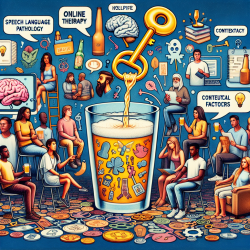Introduction
The COVID-19 pandemic has significantly impacted mental health worldwide, with college students being particularly vulnerable due to the abrupt shift to online learning and social isolation. A recent study titled "Associations of Psychological Capital, Coping Style and Emotional Intelligence with Self-Rated Health Status of College Students in China During COVID-19 Pandemic" provides valuable insights into how emotional intelligence, psychological capital, and coping styles can influence students' self-rated health. This blog explores these findings and offers practical applications for practitioners to improve student outcomes.
Understanding Key Concepts
- Emotional Intelligence (EI): The ability to perceive, understand, and manage emotions effectively. High EI is linked to better stress management and interpersonal relationships.
- Psychological Capital (PsyCap): Comprises self-efficacy, optimism, hope, and resilience. It empowers individuals to overcome challenges and maintain mental well-being.
- Coping Style: The strategies individuals use to manage stress. Positive coping styles involve active problem-solving and seeking social support.
Research Findings
The study conducted a survey with 367 college students in China, assessing their self-rated health, emotional intelligence, psychological capital, and coping styles. Key findings include:
- Students with higher emotional intelligence, psychological capital, and positive coping styles reported better self-rated health.
- Psychological capital had the most substantial impact on health, highlighting its role as a crucial resource for managing stress.
- Emotional intelligence and coping styles also contributed significantly, with a three-way interaction indicating that these factors collectively influence health outcomes.
Practical Applications for Practitioners
Practitioners can leverage these insights to enhance student well-being through targeted interventions:
- Emotional Intelligence Training: Implement workshops to help students develop emotional awareness and regulation skills. This can improve their ability to manage stress and maintain positive relationships.
- Building Psychological Capital: Encourage activities that foster self-efficacy, optimism, hope, and resilience. Programs that focus on goal setting, positive thinking, and resilience training can be beneficial.
- Promoting Positive Coping Styles: Teach students effective stress management techniques, such as problem-solving and seeking social support. Encourage them to engage in activities that promote mental well-being, such as mindfulness and exercise.
Encouraging Further Research
While this study provides valuable insights, further research is needed to explore these associations in diverse populations and settings. Longitudinal studies could provide a deeper understanding of how these factors interact over time and influence long-term health outcomes.
Conclusion
The study underscores the importance of emotional intelligence, psychological capital, and coping styles in promoting student health during challenging times. By implementing targeted interventions, practitioners can support students in developing these critical skills, ultimately enhancing their well-being and academic success.
To read the original research paper, please follow this link: Associations of Psychological Capital, Coping Style and Emotional Intelligence with Self-Rated Health Status of College Students in China During COVID-19 Pandemic.










